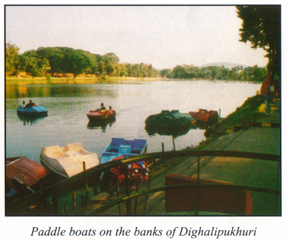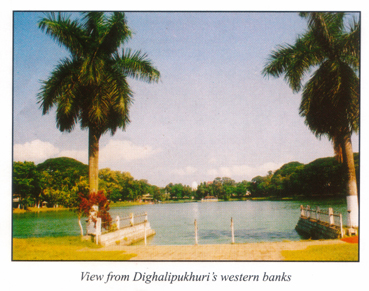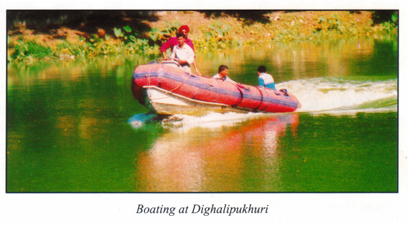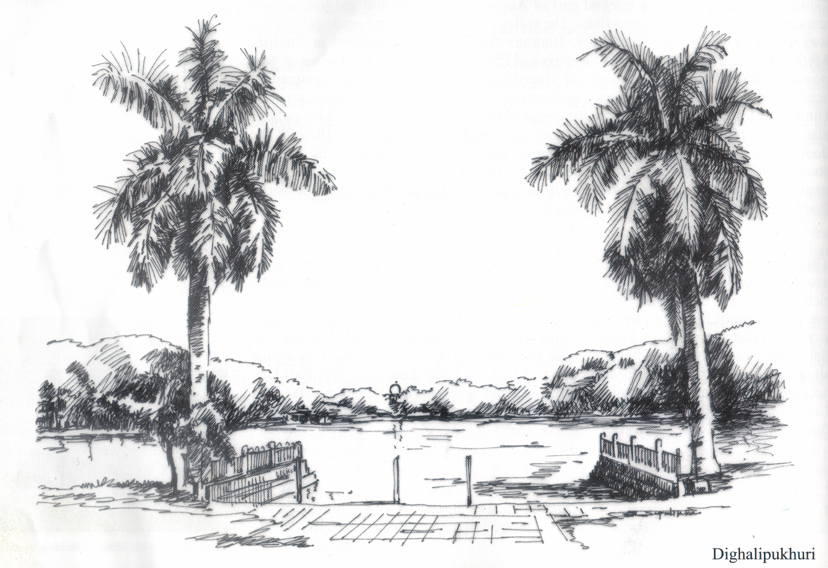“Life is a glorious cycle of song
A medley of
extemporaneous
And love is a thing that can never go wrong….”
Sitting on the banks of the Dighalipukhuri in Guwahati, one is convinced that love can only grow stronger. In the ripples of this pond float many a story of two hearts beating as one. And on its banks love finds a beautiful harbor.
This old pond, the most rare of rare lovely sites, dates back to several thousand years if one goes by the legends. According to common belief it was dug during the swayamvar of Princess Bhanumati, daughter of Pragjyotishpura King Bhagadutta. Hundreds of princes from different parts of India participate in the swayambar in which the challenge was to hit the eye of a live fish - tied to a fishing rod - by looking at it reflected image in the waters of the pond, and win the bride. Kaurava prince Duryodhana won the challenge and took Bhanumati as his wife.
Dighalipukhuri derives its name from its length, dighal meaning long in the Assamese language. Originally it was half a mile long and was dug in straight from the Brahmaputra. Then, it was quite common for boatmen carrying fish and other merchandise to enter the pukhuri (pond) straight from the river.
|
Later, however, it was separated from the river by filling up land, and it is on this stretch that the Circuit House and the High Court now stand.
After the establishment of the Gauhati Municipality in 1853 and its subsequent elevation to Class I category in the 1870s, Dighalipukhuri figured importantly in all town beautification schemes. Sadly, except for an initiative taken by Manick Chandra Baruah when he was Municipal Commissioner to clear weeds and “apply 140 mounds of limestone to clear its banks from snakes, insects and lizards”, nothing substantial was done on the ground.
In 1914 the municipality issued licenses to fishing enthusiasts against a fee and Dighalipukhuri became the hub of the town.
|

|
In the autumn of 1932 however two sensational incidents left the town’s residents scared of venturing near the pukhuri. On October 4 a full-grown tiger was spotted strolling in the eastern corner of the pond. It was not long before the news spread like wildfire throughout the town and traders pulled down their shutters. Within an hour the town wore a deserted look. At 10:30 pm the tiger walked past Panbazar into Lakhtokia where a few brave young men gave chase. All through the night it was a game of hide-and-seek.
|

|
Finally, at drawn, the tiger was hunted down by one Mohammad Ali. A few days after this incident, on Dashami day of Durga
Puja, a chowkidar of Cotton College was found dead with grevious injuries on his neck. Although there was no evidence of any tiger attack, townsmen assumed that the chowkidar had fallen prey to a man-eater. Till long after the incidents the Dighalipukhuri was referred to as the Bagh Kota
Pukhuri. (The town already had a Nag Kota Pukhuri in Panbazar).
The Cotton College Boating Club was floated at Dighalipukhuri way back in 1918. In 1938, one of its members,
Jamaluddin, met with a watery grave.
|
A year later, in 1939, Cottonians started a swimming club in his memory.
The first serious endeavour to beautify the pond was taken up when Radha Gobinda Barua became the first mayor of
Guwahati. The boundary wall and fencing was strengthened and gardens were laid on its banks. Boating and other recreational facilities however were introduced only in the last quarter of the 20th century.
As the town grew, several institutions wished to share the
|
pukhuri’s breeze and beauty and Curzon Hall, Earle Law College, Handique Girl’s College, Kamarupa Anusandhan Samiti, Assam State Museum, India Club, Assam Sahitya Sabha, Indian National Congress office, Assam Lawn Tennis Association, District Library, Rabindra Bhawan and Gauhati High Court came up. During the chief ministership of Bimala Prasad Chaliha, the state fishery department was also established on the pukhuri’s northern side.
Today all of them and more besides, share the romantic banks and sun-kissed ripples of the Dighalipukhuri. And lovers, while stealing moments on its banks, are convinced that “love triumphs… beside a lake”.
|

|
|



